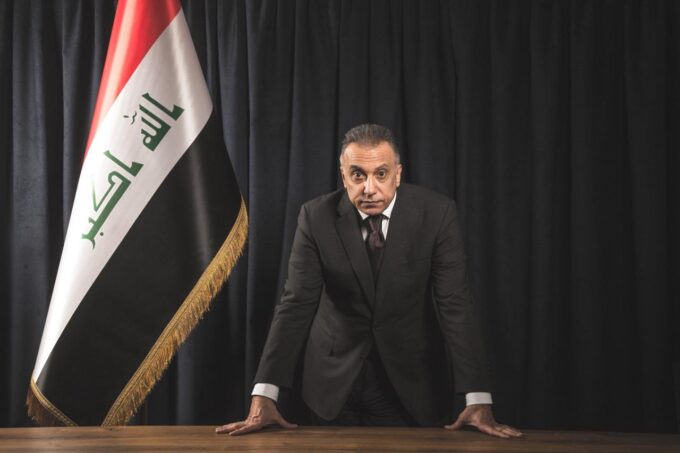
By Ibrahim Rihan
Over the past two years, Iraqi Prime Minister, Mustafa Al-Kazemi, has been chipping away at a never-ending mountain of obstacles.
Given his calm, sober, and perceptive nature, he has proven his positive influence on Iraq’s issues, like a musician who tries hard to set the pace in the Middle East’s chaotic symphony.
Whenever I hear the name Mustafa Al-Kazemi, It brings immediately to my mind the name of former Lebanese Prime Minister Rafik Hariri.
Al-Kazemi follows a method of decisiveness, similar to that of former Lebanese Prime Minister Rafik Hariri.
Al-Kazemi succeeded to move on from an influential figure in internal Iraqi politics to one of the top leaders in the MENA region.
Al-Kazemi has created an internationally respected image including the so-called “political enemies.” This is most likely because of the strong relationships he established with leaders of Arab nations, especially the Gulf states.
Al-Kazemi opened a new page for Iraq, removing Saddam Hussein’s harmful reputation that formed after his unwarranted invasion of Kuwait and the abuse of it by neighboring Irani forces.
The United States views Al-Kazemi as a statesman and an institutional leader. Despite sailing his ship in a sea of militias with different political interests, he has proven his immense commitment to the foreign relations of Iraq. No previous Iraqi leader has dared to establish such relationships with neighboring countries since 2003.
However, Al-Kazemi’s most valuable contribution to Iraq has been his ability to turn disputes and political disagreements into a peaceful approach and dialogue.
Undoubtedly, his greatest achievements were to gather at one table the Kingdom of Saudi Arabia and Iran, an achievement that no other country has had the skill to make happen.
Of course, his unique regional and international roles and contributions helped him greatly in his diplomatic efforts, but this does not counter his consistent willingness in seizing the opportunity.
Iraq still has tense relations with its neighbor, Iran, that never demonstrate support for Al-Kazemi as a prime minister. Yet, Iran strongly understands that Al-Kazemi’s era is a critical event occurring in its “backyard”.
Al-Kazemi works to stabilize institutions in a country with constant hostility from the Iranian militias, while he receives all the international and Arab support he needs.
Most prominently, only two and a half weeks ago at the Jeddah Summit, the exceptional praise he received following his bilateral meeting with American President Joe Biden manifested his clear role in the region while Biden remained on the sidelines.
Al-Kazemi is fully aware of Wahington’s desire for the stable Middle East that hides in the shade of an ongoing war between Russia and Ukraine and its repercussions on the energy market.
However, one will make no mistake if predicting that the key to stability in the MENA region lies in Riyadh and Tehran.
Saudi Arabia is the largest Arab country in the peninsula and one of the main exporters of oil, with a massive influence on the global crude oil market, much like Iran.
Tehran does not only attain great power in the energy market, but it also constitutes a huge threat to Maritime security dues to its role in overseeing the Strait of Hormuz, through which 20% of the world transports oil through.
On top of all, the Strait of Hormuz adds more power to the Irani-supported militia of Houthi in Yemen, on the outskirts of the Bab el-Mandeb Strait, the second most crucial strait after Hormuz.
whoever follows the remarkable calm on the Yemeni front and reads the US-Iraqi statement that was released after the summit, will easily realize that Al-Kazemi has succeeded to a large extent in the first step of his difficult mission to break the ice between the two arch-neighbors, Saudi Arabia and Iran.
Translated/Edited by Husam Ramadan
